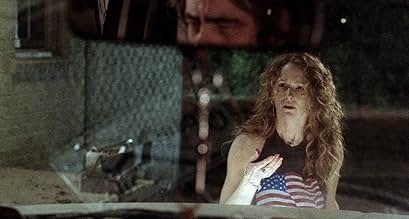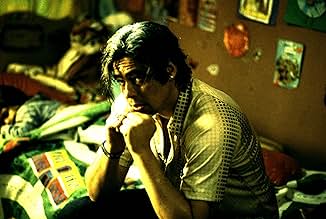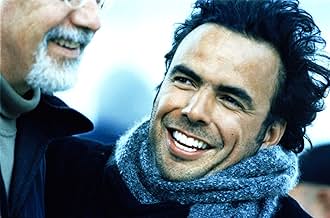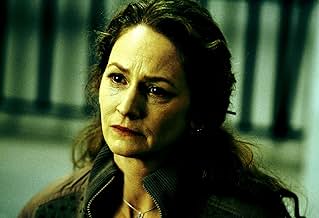Un accident bizarre réunit un mathématicien gravement malade, une mère éplorée et un ex-détenu repenti.Un accident bizarre réunit un mathématicien gravement malade, une mère éplorée et un ex-détenu repenti.Un accident bizarre réunit un mathématicien gravement malade, une mère éplorée et un ex-détenu repenti.
- Réalisation
- Scénario
- Casting principal
- Nommé pour 2 Oscars
- 30 victoires et 79 nominations au total
Marc Musso
- Freddy
- (as Marc Thomas Musso)
Avis à la une
21 Grams features performances by Sean Penn, Benecio Del Torro and Naomi Watts that are remarkable not only for their believability, but also for the range of gut wrenching emotion they bring to bear. Telling his story almost violently out of sequence, Iñárritu makes no apology for presenting information in a manner that is often abrupt and/or confusing. His choice to juxtapose a myriad of images to reveal the complexities and subtleties of the characters challenges the viewer even as it elevates the story.
Each of the three main characters faces a series of crises that unfold in the fullness of Iñárritu's version of time. By so carefully painting characters' surroundings along with their reactions to the events that change their lives, lead characters are stripped to the bone. The supporting cast is nothing short of miraculous (notably Clea Duvall, Charlotte Gainsborg and Melissa Leo) and completes a wonderfully complex series of portraits of the three main characters.
Like few films in recent memory, 21 Grams fully reveals what it is to be human in the clutches of life's most challenging moments.
Each of the three main characters faces a series of crises that unfold in the fullness of Iñárritu's version of time. By so carefully painting characters' surroundings along with their reactions to the events that change their lives, lead characters are stripped to the bone. The supporting cast is nothing short of miraculous (notably Clea Duvall, Charlotte Gainsborg and Melissa Leo) and completes a wonderfully complex series of portraits of the three main characters.
Like few films in recent memory, 21 Grams fully reveals what it is to be human in the clutches of life's most challenging moments.
They messed up it so hard. Who thought it's a good idea to make the chronology of the scenes in the almost random order. You get the ending spoiled by the first half hour and you can predict majority of the story already. This movie had potential, the actors were amazing, the story itself would be interesting if not for the chronology. Such a failure.
A movie directed in inimitable style, Inarritu's 21 Grams is a provocative, deeply moving filmic work that explores several fundamental questions: What is a life, what is its value, and can we place a value on it? Directed in a series of small, seemingly disconnected fragments that come together as the film progresses, the film is thus shot in a style deeply unfamiliar to American moviegoers. At the beginning, most American viewers will find the choppy, nonlinear timeline distracting and frustrating - a cinematic form of coitus interruptus where once on the verge of revealing an underlying plot concept, the fragment abruptly stops and is picked up at an unrelated point. This style continues throughout, but don't worry. The answers do come after a while.
It is worth noting that the actual storyline, when told linearly, is not as gripping as when told in this style. The linear form would resemble a typical mindless story of the wounded seeking revenge. The way Inarritu constructs the story allows him to give the viewer a sense of where various characters are at the same time without the appearance of repetition. It allows moviegoers to see actual events first, then form associations later. There is a sense of, "Oh, now I get it!" that would be conspicuously absent if 21 Grams were told linearly.
Moving on, the performances of the actors and actresses in the film are incredible. All are believable. The animalistic hatred of Christina Peck (Naomi Watts) for Jack Jordan (Benicio Del Toro), the deeply troubled father who regrets his big mistake and has become a born again Christian, is palpable throughout. Paul Rivers (Sean Penn) is genuine in his efforts to repay, literally, a life debt. The performances breathe further life into the series of events that 21 Grams attempts to chronicle.
By the film's ending, the entire tale of what has transpired is revealed to the viewer. Since key plot elements often appear in several of the disconnected sequences, they come to be points of reference that astute moviegoers can use to sort the rest of the plot. By the end, everything is complete. The title is finally put into context, and the attempt to answer the three previously mentioned fundamental questions is made. Yes, at the beginning, this movie may not seem to make much sense, and it may even be frustrating to watch. Still, resist the temptation to get up and leave the theater. Stick around and watch the whole thing. The pieces do ultimately fall into place. I promise. And besides, there's only one way to find out.
It is worth noting that the actual storyline, when told linearly, is not as gripping as when told in this style. The linear form would resemble a typical mindless story of the wounded seeking revenge. The way Inarritu constructs the story allows him to give the viewer a sense of where various characters are at the same time without the appearance of repetition. It allows moviegoers to see actual events first, then form associations later. There is a sense of, "Oh, now I get it!" that would be conspicuously absent if 21 Grams were told linearly.
Moving on, the performances of the actors and actresses in the film are incredible. All are believable. The animalistic hatred of Christina Peck (Naomi Watts) for Jack Jordan (Benicio Del Toro), the deeply troubled father who regrets his big mistake and has become a born again Christian, is palpable throughout. Paul Rivers (Sean Penn) is genuine in his efforts to repay, literally, a life debt. The performances breathe further life into the series of events that 21 Grams attempts to chronicle.
By the film's ending, the entire tale of what has transpired is revealed to the viewer. Since key plot elements often appear in several of the disconnected sequences, they come to be points of reference that astute moviegoers can use to sort the rest of the plot. By the end, everything is complete. The title is finally put into context, and the attempt to answer the three previously mentioned fundamental questions is made. Yes, at the beginning, this movie may not seem to make much sense, and it may even be frustrating to watch. Still, resist the temptation to get up and leave the theater. Stick around and watch the whole thing. The pieces do ultimately fall into place. I promise. And besides, there's only one way to find out.
Many movies in the modern era have experimented with fractured chronology, but most of the time this technique is used for entertainment purposes only. "21 Grams" is an intense and thoughtful film enriched by this technique, taken to an extreme I've never seen before. We're not talking "Pulp Fiction" here, where a small series of vignettes are arranged out of sequence. Every individual scene in "21 Grams" seems to be distributed almost at random anywhere in the film. You have to concentrate when seeing this film for the first time, because you'll have trouble figuring out what's going on, and even as a plot starts to emerge, some of the details won't be understandable until the very end. But it pays off: this isn't like "Memento" or "Mulholland Drive," where you may need multiple viewings to understand it all. By the end of this film, the story turns out to be quite straightforward. It's like seeing a gigantic jigsaw puzzle gradually pieced together.
Unlike many other films that use this sort of device, "21 Grams" is a character drama, not a psychological thriller. The story would still work if it were told in chronological order. Why the scenes are arranged as they are is not altogether clear, on the surface. I felt like I was watching a mystery, but after everything came together it became evident that none of the mystery was contained in the plot itself. This fact has led some critics to suggest that the scrambled scene arrangement is nothing more than a cute gimmick designed to make the film more engaging. But I believe that the device does serve a legitimate purpose, by drawing out the complexity of the characters and their situations.
Life is not good for the three principal characters, and it isn't getting better. Sean Penn plays a 40-something man with a failing heart, Naomi Watts plays a young woman facing great tragedy, and Benicio Del Toro plays an ex-con consumed by guilt. Penn and Watts come off as ordinary individuals reacting as anyone might under the circumstances, but Del Toro's character is particularly fascinating. He's been rehabilitated through religion, but he's still far from perfect. As a father, he has a scary presence that makes him seem borderline abusive at times. But he has developed a powerful conscience. Is he right to hate himself for what he did? The movie never answers that question. I just appreciated that the film resisted the temptation to make him into a caricature. He is neither hero nor villain. He is simply understandable on a very basic human level, as are the other two characters.
We have the feeling that Watts and Penn are wrong to condemn him as strongly as they do. They do not understand his situation, or that he's suffering just about as much as they are. On the other hand, we as viewers can perfectly understand where Watts is coming from. That's what makes the scrambled scene arrangement so effective: it never allows any one character to gain our total sympathy. By the time we've sorted out the plot threads, we've identified with all three characters on an emotional level while at the same time understanding their faults. These people are trapped in their own limited worlds, and with our omniscient viewpoint we can scarcely blame any one of them for their feelings or actions. We can see clearly what these characters cannot, which is that they are more victims of cruel fate than people who are truly guilty of anything.
What is the movie's message? That people shouldn't be so quick to judge others? That could be one interpretation, but what's nice about the film is that it doesn't hammer this lesson into us. It just tells a moving and stirring tale about complex characters, and viewers can take from it what they please. The title refers to a parapsychological belief about the weight of the human soul, and it's used in this film as a metaphor for the fragility of life. If life is fragile, then it's also precious, and people need not waste their time on vengeance.
Unlike many other films that use this sort of device, "21 Grams" is a character drama, not a psychological thriller. The story would still work if it were told in chronological order. Why the scenes are arranged as they are is not altogether clear, on the surface. I felt like I was watching a mystery, but after everything came together it became evident that none of the mystery was contained in the plot itself. This fact has led some critics to suggest that the scrambled scene arrangement is nothing more than a cute gimmick designed to make the film more engaging. But I believe that the device does serve a legitimate purpose, by drawing out the complexity of the characters and their situations.
Life is not good for the three principal characters, and it isn't getting better. Sean Penn plays a 40-something man with a failing heart, Naomi Watts plays a young woman facing great tragedy, and Benicio Del Toro plays an ex-con consumed by guilt. Penn and Watts come off as ordinary individuals reacting as anyone might under the circumstances, but Del Toro's character is particularly fascinating. He's been rehabilitated through religion, but he's still far from perfect. As a father, he has a scary presence that makes him seem borderline abusive at times. But he has developed a powerful conscience. Is he right to hate himself for what he did? The movie never answers that question. I just appreciated that the film resisted the temptation to make him into a caricature. He is neither hero nor villain. He is simply understandable on a very basic human level, as are the other two characters.
We have the feeling that Watts and Penn are wrong to condemn him as strongly as they do. They do not understand his situation, or that he's suffering just about as much as they are. On the other hand, we as viewers can perfectly understand where Watts is coming from. That's what makes the scrambled scene arrangement so effective: it never allows any one character to gain our total sympathy. By the time we've sorted out the plot threads, we've identified with all three characters on an emotional level while at the same time understanding their faults. These people are trapped in their own limited worlds, and with our omniscient viewpoint we can scarcely blame any one of them for their feelings or actions. We can see clearly what these characters cannot, which is that they are more victims of cruel fate than people who are truly guilty of anything.
What is the movie's message? That people shouldn't be so quick to judge others? That could be one interpretation, but what's nice about the film is that it doesn't hammer this lesson into us. It just tells a moving and stirring tale about complex characters, and viewers can take from it what they please. The title refers to a parapsychological belief about the weight of the human soul, and it's used in this film as a metaphor for the fragility of life. If life is fragile, then it's also precious, and people need not waste their time on vengeance.
Some movies are like a novel. Some movies are like a poem. Some films have flashbacks and flash-forwards. Some, like `Memento,' stretch the boundaries of convention and take wild risks such as moving the drama from the end to the beginning. `21Grams' is a cinematic poetic explosion, shaking all the pieces hard as hell, and then tossing them in the air to fall at random. Directed by Alejandro Gonzalez Inarritu, he gives the audience the puzzle unraveled, demanding that we piece together the story from interlaced past, present and future events. It is part flashy gimmick, part artistic mastery, but always compelling.
This is not a film for either the faint of heart or lazy of mind. Nor is it for those who become frustrated by film that dares to step outside the linear plot and paint-by-numbers formula. The mishmash of past/present/future is allegorical in the sense that we all carry our past, all hinge our hearts on the future, and all struggle with a `present' as dotty and haunted as this film so wildly illustrates.
In `21 Grams' it is required that the viewer surrender. As in life, there is no control. I must admit that I became a bit antsy and pressed for answers when none were being provided. You are riveted by events and players that intermingle in a haphazard mishmash of time with a rebellious lack of structure. You can either go with the flow-or back out to your car. Since I saw only one person exit the theater, for any reason, in the 125 minutes running time, I conclude that the fully occupied theater was as riveted as I was, even to the point of extreme bladder control.
The performances are stunning. Sean Penn is always good, Benicio Del Toro solidifies his Oscar, and Naomi Watts is the big talent to watch. Her emotional honesty is beyond acting-I believed her to feel the pain she displayed.
The `plot' almost seems inconsequential. The film is about the depth of human feeling in our brief interplay between living and dying. It's about damnation and redemption, revenge and forgiveness, surrender and salvation. It offers no explanations. It merely illustrates the human experience in a trenchant manner that makes us aware that every minute of every day is a precarious drama that we look upon more lightly than we should. The dramatic cortex is the human heart-lost, gained, tormented, anguished and confused. The metaphorical context is the fleeting nature of each heart's temporal beat and our desperately valiant struggle to flesh out our mortal hearts' desires.
This is not a film for either the faint of heart or lazy of mind. Nor is it for those who become frustrated by film that dares to step outside the linear plot and paint-by-numbers formula. The mishmash of past/present/future is allegorical in the sense that we all carry our past, all hinge our hearts on the future, and all struggle with a `present' as dotty and haunted as this film so wildly illustrates.
In `21 Grams' it is required that the viewer surrender. As in life, there is no control. I must admit that I became a bit antsy and pressed for answers when none were being provided. You are riveted by events and players that intermingle in a haphazard mishmash of time with a rebellious lack of structure. You can either go with the flow-or back out to your car. Since I saw only one person exit the theater, for any reason, in the 125 minutes running time, I conclude that the fully occupied theater was as riveted as I was, even to the point of extreme bladder control.
The performances are stunning. Sean Penn is always good, Benicio Del Toro solidifies his Oscar, and Naomi Watts is the big talent to watch. Her emotional honesty is beyond acting-I believed her to feel the pain she displayed.
The `plot' almost seems inconsequential. The film is about the depth of human feeling in our brief interplay between living and dying. It's about damnation and redemption, revenge and forgiveness, surrender and salvation. It offers no explanations. It merely illustrates the human experience in a trenchant manner that makes us aware that every minute of every day is a precarious drama that we look upon more lightly than we should. The dramatic cortex is the human heart-lost, gained, tormented, anguished and confused. The metaphorical context is the fleeting nature of each heart's temporal beat and our desperately valiant struggle to flesh out our mortal hearts' desires.
Le saviez-vous
- AnecdotesThe film was shot almost completely with hand-held cameras.
- GaffesWhen the Private Investigator gives Paul the revolver, he flips it open to show that it is loaded. He then spins the cylinder and we hear a ratcheting sound. When a revolver is open, there is no ratchet mechanism connected to the cylinder...it rotates freely and silently.
- Citations
[last lines]
Paul Rivers: How many lives do we live? How many times do we die? They say we all lose 21 grams... at the exact moment of our death. Everyone. And how much fits into 21 grams? How much is lost? When do we lose 21 grams? How much goes with them? How much is gained? How much is gained? Twenty-one grams. The weight of a stack of five nickels. The weight of a hummingbird. A chocolate bar. How much did 21 grams weigh?
- Crédits fousThanks to ÁLos amo!
- Bandes originalesCan We Get Together
(2003)
Written by Renee Funderburgh, Anson Funderburgh and John Street
Performed by Anson Funderburgh & The Rockets (as Anson Funderburgh and Rockets)
Licensed courtesy of Bullseye Blues & Jazz, a Rounder Records Group label
By Arrangement with Ocean Park Music Group
Meilleurs choix
Connectez-vous pour évaluer et suivre la liste de favoris afin de recevoir des recommandations personnalisées
- How long is 21 Grams?Alimenté par Alexa
Détails
- Date de sortie
- Pays d’origine
- Site officiel
- Langue
- Aussi connu sous le nom de
- 21 gramos
- Lieux de tournage
- Sociétés de production
- Voir plus de crédits d'entreprise sur IMDbPro
Box-office
- Budget
- 20 000 000 $US (estimé)
- Montant brut aux États-Unis et au Canada
- 16 290 476 $US
- Week-end de sortie aux États-Unis et au Canada
- 274 454 $US
- 23 nov. 2003
- Montant brut mondial
- 60 466 876 $US
- Durée
- 2h 4min(124 min)
- Couleur
- Mixage
- Rapport de forme
- 1.85 : 1
Contribuer à cette page
Suggérer une modification ou ajouter du contenu manquant



















